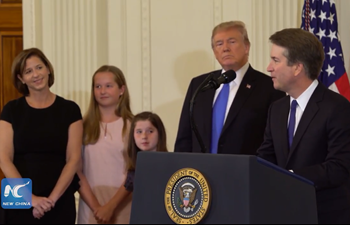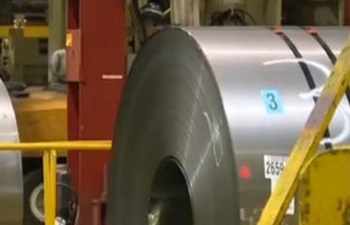by Peter Mertz
AMSTERDAM, the United States, July 12 (Xinhua) -- Matt Flikkema heard the bad news on the way to his farm Wednesday morning.
"I was listening to the Great Falls (Montana) radio station, and they said wheat had dropped 17 cents a bushel," Flikkema said.
"Not good," the life-long farmer said.
Flikkema's 800-acre (323.7 hectares) farmland in southwest Montana is a mid-sized operation among the 27,000 farms across the state.
Flikkema expressed his growing concern that farmers are getting hit "in both directions" by the U.S.-China trade dispute.
"The uncertainty about the future has us deeply concerned," said Flikkema, who was the former president of the Montana Grain Growers Association.
Agriculture is the biggest industry in Montana, America's fourth-largest state which borders Canada to the north.
With a "break-even point at five dollars a bushel," wheat farmers like Flikkema are watching with dismay as commodity prices fall and their profits vanish.
The latest challenge caused by trade tariffs has made Montana farmers doubly fearful.
Montana farmers are watching the crop prices drop daily, as markets are responding to the current situation.
In addition, the cost of equipment and agricultural products has already jumped, led by steel and aluminum retaliatory tariff hikes of 25 percent.
Agricultural experts have suggested that farmers shift to alternative crops to adjust to the ever-changing supply and demand price-point equation. But for farmers like Flikkema, who will be 70 on his next birthday, the future looks bleak.
"I don't have a choice ... I have no alternative crops to plant," he said. Flikkema grows barley and wheat on a farmland which equals about 340 football fields by himself.
Flikkema showed Xinhua his vast fields Wednesday, and recalled the innumerable challenges he has faced over the years in order to survive.
Like many farmers, he relies on "passive" water -- in other words, rain -- to irrigate his fields. Other crops just won't work on his land, he said.
The third-generation farmer, whose ancestors came from the Netherlands to this remote part of the United States at the turn of the 20th century, has weathered his share of hardships over the 40 years he farmed the land.
From 2006 to 2008, a severe drought killed his dry pea plants. Before that, potatoes were a loss leader.
This year, after a frost-less May, Mother Nature dealt his wheat crop with a "frost card" on June 12 that browned the buds of his tender spring plants.
"Right here," Flikkema said, pointing to a tiny, brown spot on a one-foot-high wheat stalk that is about a month away from harvest.
That was an unexpected blow for a highly-respected farmer who sells his barley to the Molson-Coors Company for beer production.
The recent U.S.-China trade dispute is another painful conundrum Flikkema has no idea how to solve.
"All we want is a fair price for our product in an open market place," he said, adding that most farmers would prefer to be far removed from the politics of Washington.
"The Chinese economy is booming these days and they are demanding a better diet, better living conditions and the quality product we can provide them from Montana," Flikkema said.
"We can't afford to lose that opportunity."













